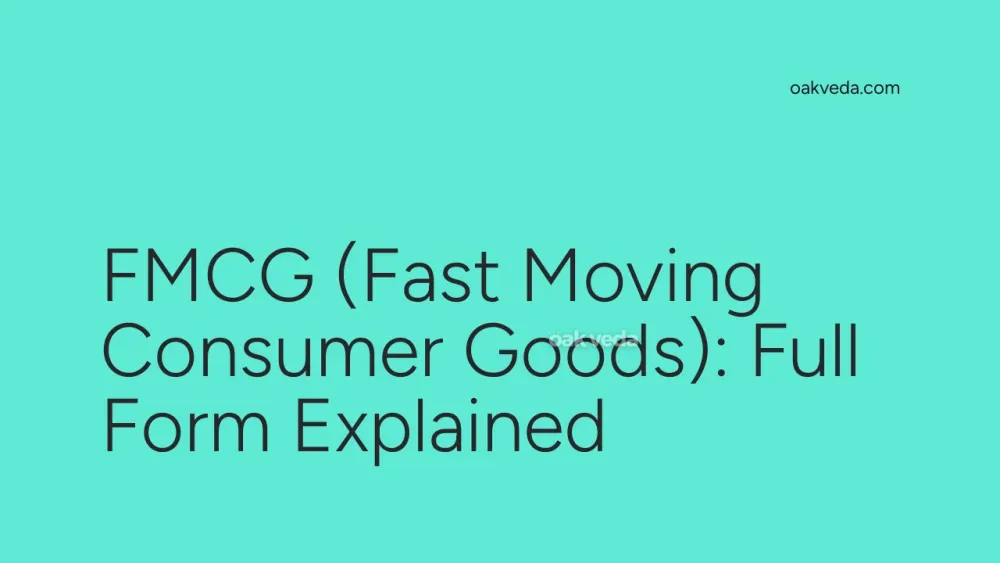
What is the Full Form of FMCG?
FMCG is an acronym widely used in the business and retail sectors. The full form of FMCG is Fast Moving Consumer Goods. This term refers to products that are sold quickly and at relatively low costs. These items are essential in our daily lives and are characterized by their high turnover rate and short shelf life.
What is Fast Moving Consumer Goods?
Fast Moving Consumer Goods, or FMCG, encompass a wide range of products that consumers use frequently and purchase regularly. These items are typically non-durable goods that are consumed rapidly and need frequent replacement. FMCG products are also known as Consumer Packaged Goods (CPG) in some regions.
Origin and Development of Fast Moving Consumer Goods
The concept of FMCG emerged with the rise of mass production and modern retail in the early 20th century. As manufacturing processes became more efficient and distribution networks expanded, companies could produce and sell goods at a larger scale and lower prices. This led to the development of a distinct category of products that moved quickly through the supply chain and off store shelves.
How does the FMCG Industry work?
The FMCG industry operates on a model of high-volume sales with low profit margins per unit. Key aspects of the industry include:
- Extensive distribution networks
- Strong brand management
- Continuous product innovation
- Efficient supply chain management
- Aggressive marketing and promotional strategies
Companies in this sector focus on creating brand loyalty, optimizing production costs, and maintaining a wide market presence to ensure profitability.
Types of Fast Moving Consumer Goods
FMCG products can be categorized into several groups:
- Food and Beverages: Includes processed foods, dairy products, soft drinks, and snacks.
- Personal Care: Encompasses toiletries, cosmetics, and hygiene products.
- Household Care: Covers cleaning products, detergents, and air fresheners.
- Over-the-Counter Drugs: Non-prescription medications and health supplements.
- Other Consumables: Items like stationery, batteries, and light bulbs.
Functions of Fast Moving Consumer Goods
FMCG products serve several important functions in the consumer market:
- Meeting daily needs and conveniences
- Providing quick solutions for personal and household care
- Offering affordable options for regular consumption
- Driving retail sales and economic activity
- Influencing consumer behavior and lifestyle choices
Applications of Fast Moving Consumer Goods
The applications of FMCG products are vast and touch nearly every aspect of daily life:
- Personal Hygiene: Soaps, shampoos, toothpaste, and deodorants
- Food Preparation: Cooking oils, spices, and ready-to-eat meals
- Home Maintenance: Cleaning supplies, air fresheners, and pest control products
- Health and Wellness: Vitamins, supplements, and over-the-counter medicines
- Convenience: Packaged snacks, beverages, and instant foods
Features of Fast Moving Consumer Goods
FMCG products share several common characteristics:
- High Turnover: Sold quickly and frequently
- Low Price: Generally affordable for most consumers
- Short Shelf Life: Perishable or meant for quick consumption
- High Volumes: Produced and sold in large quantities
- Low Profit Margins: Per unit profit is typically small
- Impulse Purchases: Often bought without much deliberation
- Brand Sensitivity: Strong influence of brand loyalty and recognition
Benefits of Fast Moving Consumer Goods
The FMCG sector offers numerous benefits to both consumers and businesses:
-
For Consumers:
- Easy availability of essential products
- Affordable prices due to economies of scale
- Wide variety of choices
- Convenience in daily life
-
For Businesses:
- Steady cash flow from regular sales
- Opportunities for brand building
- Potential for market expansion
- Resilience during economic downturns
Limitations or Challenges of Fast Moving Consumer Goods
Despite its strengths, the FMCG sector faces several challenges:
- Intense Competition: Saturated market with numerous players
- Price Sensitivity: Consumers often switch brands based on price
- Environmental Concerns: Packaging waste and sustainability issues
- Changing Consumer Preferences: Rapid shifts in trends and health consciousness
- Supply Chain Complexities: Managing large-scale distribution efficiently
- Regulatory Compliance: Adhering to varying standards across different markets
Future Developments in Fast Moving Consumer Goods Technology
The FMCG industry is evolving with technological advancements:
- E-commerce Integration: Increasing online sales and direct-to-consumer models
- Personalization: Using data analytics for targeted marketing and product development
- Sustainable Packaging: Developing eco-friendly packaging solutions
- Smart Products: Incorporating IoT technology in consumer goods
- Artificial Intelligence: Enhancing supply chain management and demand forecasting
FAQs on FMCG Full Form
-
What does FMCG stand for in business? FMCG stands for Fast Moving Consumer Goods in the business context.
-
How is FMCG different from durable goods? FMCG products have a shorter lifespan and are consumed quickly, while durable goods last longer and are used repeatedly.
-
What are some examples of FMCG companies? Some well-known FMCG companies include Unilever, Procter & Gamble, Nestlé, and Coca-Cola.
-
Is the FMCG sector important for the economy? Yes, the FMCG sector is crucial for the economy as it contributes significantly to GDP, employment, and consumer spending.
-
How has e-commerce affected the FMCG industry? E-commerce has transformed FMCG by providing new sales channels, enabling direct consumer engagement, and changing distribution strategies.
Understanding the full form and implications of FMCG is essential for both consumers and businesses in today's fast-paced market. As the industry continues to evolve, it will undoubtedly play a significant role in shaping consumer behavior and economic trends.
You may be interested in:
- SEWA (Self Employed Women's Association)
- SIB (South Indian Bank): Full Form and Overview
- FAX (Facsimile): Full Form, History, and How It Works
- ED (Enforcement Directorate): Full Form and Functions
- UPI (Unified Payments Interface): Full Form and Guide
- LASER (Light Amplification by Stimulated Emission of Radiation)

